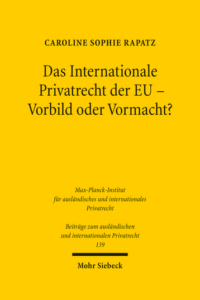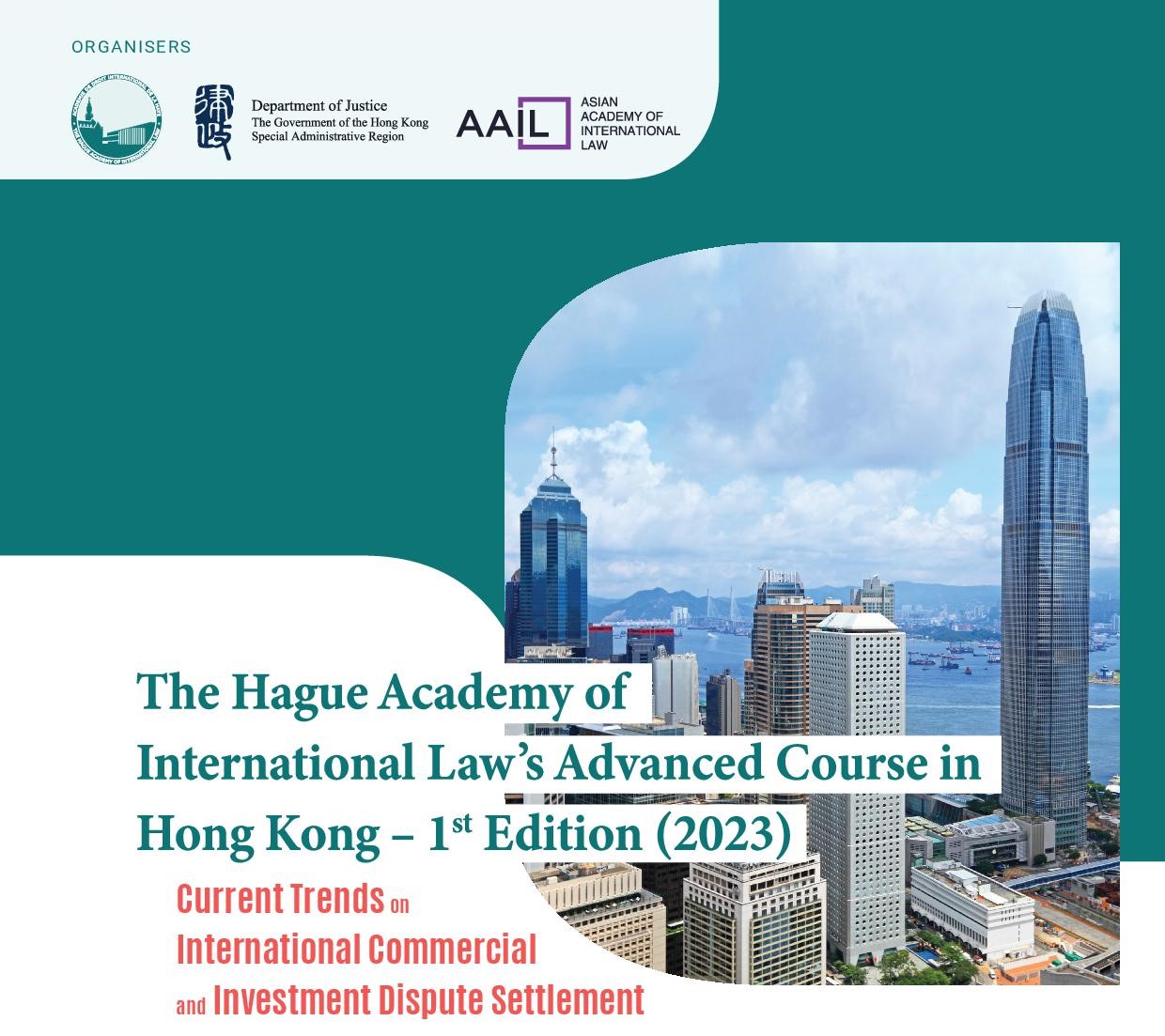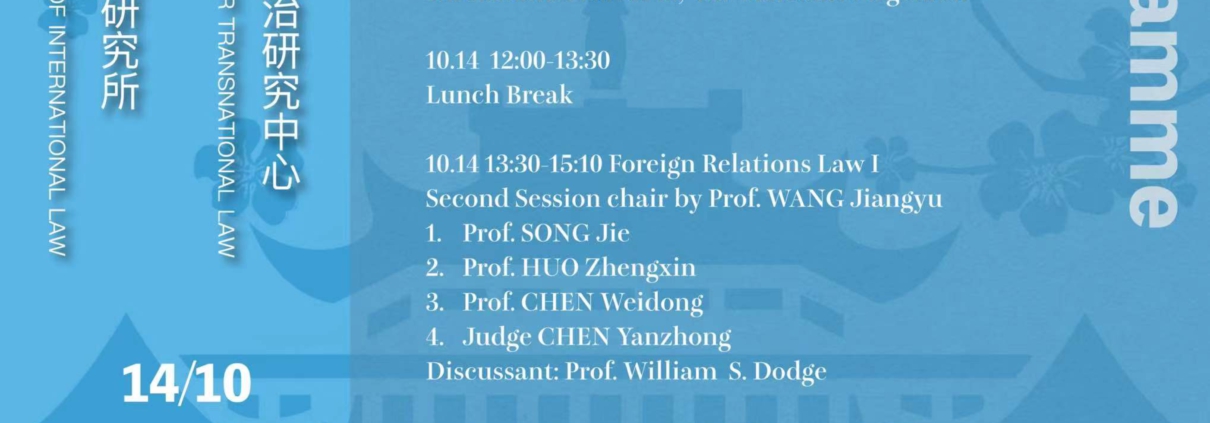Views
After the Romans: Private International Law Post Brexit
Written by Michael McParland, QC, 39 Essex Chambers, London
On 10 December 2018 the Ministry of Justice published a draft statutory instrument with the pithy title of “The Law Applicable to Contractual Obligations and Non-Contractual Obligations (Amendment etc) (EU Exit) Regulations 2018”. This indicates the current intended changes to retained EU private international law of obligations post Brexit. Read more
The renaissance of the Blocking Statute
Written by Markus Lieberknecht, Institute for Comparative Law, Conflict of Laws and International Business Law (Heidelberg)
Quite a literal “conflict of laws” has recently arisen when the EU reactivated its Blocking Statute in an attempt to deflect the effects of U.S. embargo provisions against Iran. As a result, European parties doing business with Iran are now confronted with a dilemma where compliance with either regime necessitates a breach of the other. This post explores some implications of the Blocking Statute from a private international law perspective. Read more
Service of documents in the European Judicial Space: on the Commission’s proposal for amending Regulation 1393/2007
Guest post by Dr. Stefano Dominelli of the University of Milan
In recent times, the European Commission has investigated the possibility of amending Regulation 1393/2007 on the service of judicial and extra-judicial documents between Member States. Such instrument has already settled some issues practitioners encountered under the application of the previous legal framework, in particular related to the administrative cooperation regime, the linguistic exception to service, and direct service by registered mail – or equivalent measure.
The need for a proper functioning of the cross-border service of documents mechanisms is properly highlighted in the Commission’s proposal, and new rules are suggested to further implement the system.
A recent volume, Current and future perspectives on cross-border service of documents, by Stefano Dominelli (Univ. of Milan, Dep. of International, Legal, Historical and Political Studies), explores and addresses the Commission’s proposals.
The functioning of Regulation 1393/2007 is in the first place reconstructed by the author in particular by taking into consideration the case law of a number of Member States. It is against this background that the proposed amendments are commented.
Amongst the numerous points, the book dwells upon proposed new art. 3a, and its possible impact. Acknowledging technical evolutions, communication and exchange of documents between transmitting and receiving agencies in the diverse Member States should in the future strongly rely on e-transmission. According to proposed new art. 3a, only if electronic transmission is not possible due to an unforeseen and exceptional disruption of the decentralised IT system, transmission shall be carried out by the swiftest possible alternative means. The author advises caution in the matter, as the Commission itself argues in the explanatory memorandum of the proposal that modern channels of communication are in practice not used due to old habits, legal obstacles, and lack of interoperability of the national IT systems. In this sense, the work proposes that, at least for time being, a transition to e-transmission between agencies should be encouraged as an alternative method of transmission, rather as being the only available option.
A number of proposals are made as regards the right of the addressee to refuse service on linguistic grounds. In the first place, with a solution supported in the volume, a new Annex to the Regulation should clearly set out the means and methods of the addressee to refuse service, a matter that is currently not expressly dealt with by the regulation.
The time frame for the addressee to refuse service based on linguistic grounds should become two weeks, rather than one, a solution that is strongly endorsed by the author of the volume as it is deemed to be a more satisfying point of balance between the opposing interests of the prospective plaintiff and the defendant.
Nonetheless, the work highlights that some issues that have emerged in the case law still are not addressed in the Commission’s proposal. In the first place, conflict of laws and international civil procedure issues are not referenced in the text, even though questions as the competent court before which violations of the rules on service can be invoked or which court has to investigate on the legitimate refusal to service based on linguistic grounds, have consistently been addressed by judges.
Additionally, the Commission’s proposal gives to this day no clear indication on the refusal to service based on linguistic grounds when the addressee is a corporation, a matter that, according to the author, should deserve at least some guidance in the recitals of the instrument.
The volume can be freely downloaded at https://ssrn.com/abstract=3259980
News
European Union Private International Law – Role Model or Hegemony?
 Caroline Sophie Rapatz, University of Kiel, has just published her German-language Habilitationsschrift on “European Union Private International Law – Role Model or Hegemony? Delimitations and Effects in Relation to National and International Conflict of Laws” (Das Internationale Privatrecht der EU – Vorbild oder Vormacht? Abgrenzungen und Wirkungen im Verhältnis zum nationalen und völkerrechtlichen Kollisionsrecht, Beiträge zum ausländischen und internationalen Privatrecht 139, Mohr Siebeck 2023 (XXVI, 693 p.) The book analyses the consequences of the Europeanisation of private international law (PIL) for the traditional regulatory levels of national and international (treaty and convention) conflict-of-laws rules and for the system of conflict-of-laws as a whole. The author has kindly provided has with the following summary of her insights:
Caroline Sophie Rapatz, University of Kiel, has just published her German-language Habilitationsschrift on “European Union Private International Law – Role Model or Hegemony? Delimitations and Effects in Relation to National and International Conflict of Laws” (Das Internationale Privatrecht der EU – Vorbild oder Vormacht? Abgrenzungen und Wirkungen im Verhältnis zum nationalen und völkerrechtlichen Kollisionsrecht, Beiträge zum ausländischen und internationalen Privatrecht 139, Mohr Siebeck 2023 (XXVI, 693 p.) The book analyses the consequences of the Europeanisation of private international law (PIL) for the traditional regulatory levels of national and international (treaty and convention) conflict-of-laws rules and for the system of conflict-of-laws as a whole. The author has kindly provided has with the following summary of her insights:
Application Now Open: The Hague Academy of International Law’s Advanced Course in Hong Kong – 1st Edition (2023)
 The first edition of the HAIL Advanced Courses in Hong Kong, organised in cooperation with with the Asian Academy of International Law and (AAIL) and the Hong Kong Department of Justice, will take place on 11-15 December 2023 with a focus on “Current Trends on International Commercial and Investment Dispute Settlement“.
The first edition of the HAIL Advanced Courses in Hong Kong, organised in cooperation with with the Asian Academy of International Law and (AAIL) and the Hong Kong Department of Justice, will take place on 11-15 December 2023 with a focus on “Current Trends on International Commercial and Investment Dispute Settlement“.
Read more
International Symposium on Legalisation of Foreign Relations in China
Legalisation of Foreign Relations in China, 14 Oct 2023, Wuhan University
Wuhan University and Fudan University are co-organising an International Symposium “Legalisation of Foreign Relations in China” (in English) on 14 Oct 2023. This symposium will discuss the two most important developments in Chinese law relating to foreign relations, i.e. the Foreign Relations Law and the Foreign State Immunities Law. Some presented articles will be published in the special session of the Chinese Journal of Transnational Law. This symposium will be held in person and online. Everyone is welcome. For more information and the program, please follow the event page. This event can be attended in-person or online. No registration is required.
INTERNATIONAL SYMPOSIUM ON LEGALISATION OF FOREIGN RELATIONS IN CHINA
Time: 9:30 am (Beijing time), 14 Oct 2023
Join the Zoom meeting
https://zoom.us/j/87645264148?pwd=xlbP90sgAmV0R4kFT6nkmxbL5nVlHA.1
Meeting ID: 876 4526 4148
Password: 032908



